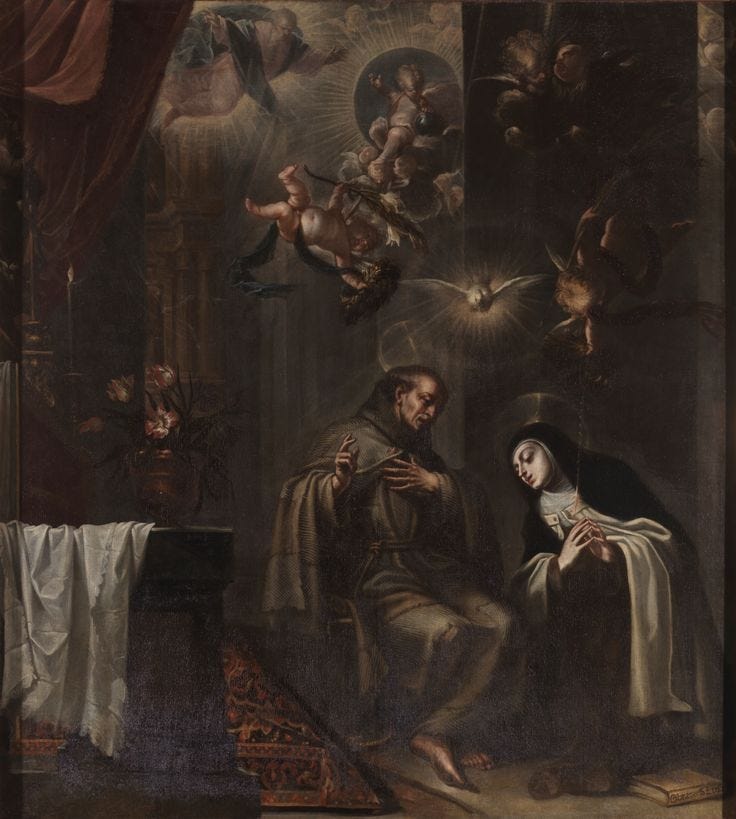St. Teresa and the Mansions, Part V: The 7th Mansions
"I hope … that you may discover how vital it is for you to put no obstacle in the way of the Spiritual Marriage of the Bridegroom with your soul." - St. Teresa of Avila, Interior Castle
The Seventh Mansions
“You may think, sisters, that so much has been said of this spiritual journey that nothing remains to be added. That would be a great mistake: God’s immensity has no limits, neither have His works; therefore, who can recount His mercies and His greatness? It is impossible, so do not be amazed at what I write about them, which is but a cipher of what remains untold concerning God.”
“When our Lord is pleased to take pity on the sufferings endured through her longing for Him, by this soul which He has spiritually taken for His bride, He, before consummating the celestial marriage, brings her into this His mansion or presence chamber. This is the seventh mansion, for as He has a dwelling-place in heaven, so has He in the soul, where none but He may abide, and which may be termed a second heaven.”
In the Seventh Mansions, St. Teresa speaks of the sublime favors bestowed on the souls which have entered into it.
But she speaks, also, of the darkness of a soul in mortal sin and the importance of our prayers for these souls.
She warns that we must not think of the soul as a ‘dark’ interior world. This is only true of souls in a state of mortal sin, who have lost sanctifying grace and are imprisoned in a gloomy dungeon. She exhorts us to constantly remember these souls in our prayers.
In previous Mansions, the graces bestowed upon a soul rendered it ‘blind’ and ‘dumb,’ all powers being lost and it feels nothing. But not so in this Seventh Mansion when He bestows the grace of the ‘divine nuptials.’
“By some mysterious manifestation of the truth, the three Persons of the most Blessed Trinity reveal themselves, preceded by an illumination which shines on the spirit like a most dazzling cloud of light.”
She goes on to draw some delicate comparisons between ‘spiritual union’ and ‘spiritual marriage.’
Spiritual Union: A Temporary Union
God enters the soul mysteriously, much like Christ entering the upper room after His Resurrection - without a door. The entrance is secret and sublime, and the soul instantaneously feels supreme delight.
“As far as can be understood, the spirit of the soul is made one with God, Who is Himself a spirit. He has thus deigned to unite Himself to His creature...”
“But the grace of union is often dissolved; for though two things are made one by union, separation is still possible, and each part then remains a thing by itself. This favor generally passes quickly, and afterwards the soul remains without His company.”
Union can be symbolized by two wax candles, the tips of which touch each other so closely that there is but one light. However, the two candles remain distinct; one candle can again be separated from the other.
Spiritual Marriage: Cannot be Divided
“But spiritual marriage is like rain falling from heaven into a river or stream, becoming one and the same liquid, so that the river and the rain water cannot be divided. This marriage may also be likened to a room into which a bright light enters through two windows — though divided when it enters, the light becomes one and the same. Perhaps when St. Paul said, ‘He who is joined to the Lord is one spirit.’ He meant this sovereign marriage, which presupposes His Majesty’s having been joined to the soul by union.”
Just as the Sacrament of Matrimony is permanent, so too is the ‘spiritual marriage.’ It is a state of union with God that remains constant, unlike the ‘prayer of union’ that comes and goes. In the ‘spiritual marriage,’ the soul remains in a state of recollection. God places the soul in His own mansion, which is in the very center of the soul itself, and the soul never moves from this center.
Right now, I am reading “The Life of St. Gemma Galgani,” and I think the following description of St. Gemma by Fr. Peter Paul gives a great example of what a soul in this state of ‘spiritual marriage’ might experience:
“What shall I say of her union with God? I can certify that this was unceasing. Even in the midst of the most distracting occupations, she was always recollected, and in mind and heart united to God. On account of this habitual and profound recollection, her voice was never heard. She answered briefly questions that were asked her and then resumed her silence. Indeed, so intimate was her union with God that she seemed more a celestial being than a creature of earth.”
- Fr. Peter Paul of the Immaculate, Passionist, “The Life of St. Gemma Galgani”
But the soul brought to this union still retains its free will:
“Do I seem to imply that after God has brought the soul thus far it is certain to be saved, and cannot fall into sin again? I do not mean this: whenever I say that the soul seems in security, I must be understood to imply for as long as His Majesty thus holds it in His care and it does not offend Him.”
Even souls united so closely to God have imperfections and must maintain fear of the Lord and trust in His care and mercy:
“Do not fancy that in spite of the strong desire and determination of these souls that they do not commit imperfections and even fall into many sins. (Not wilfully; for such people are given special grace from God on this point.) I mean, venial sins; as far as they are aware, they are free from mortal sins, although they do not feel certain they may not be guilty of some of which they are ignorant. This grieves their hearts sorely, as does the sight of the souls perishing around them.”
“Let that one among you who feels most confidence on this point fear the most, for ‘Blessed is the man who feareth the Lord.’ May His Majesty ever protect us! Let us beg Him never to permit us to offend Him: therein lies our greatest safety.”
Benefits of the Seventh Mansion:
There are graces bestowed on the soul through no action of its own, save for its total abandonment of itself to God. These graces of the Seventh Mansion are given to the soul in peace and silence:
The soul cares only for advancing the honor and glory of God, but does not neglect duties, for her duties honor the Lord.
Strong desire for suffering; joy in persecution; holds no grudges.
Former sorrow and distress that they cannot die and go to heaven is now replaced by a fervent desire to serve God.
No fear of death.
Desires to be alone, or else only occupied by things that benefit the souls of others.
St. Teresa then speaks of:
God’s intentions for conferring these favors on the soul.
How the entire foundation of the spiritual life is built on humility, through which we are able to be ‘slaves’ to God and to our neighbors, working for the salvation of souls - although this ‘work’ need not be active, it can be by way of prayer and fidelity to our duties.
Regarding the salvation of souls, she speaks of the necessity of ‘Mary’ and ‘Martha’ to go together (active and prayerful; the exterior & the interior).
“I feel certain that these graces are sent to strengthen our weakness, that we may imitate Him by suffering much. We always find that those nearest to Christ our Lord bear the heaviest cross.”
“How far from seeking men’s esteem should she be, whose soul God thus chooses for His special dwelling-place! For if her mind is fixed on Him, as it ought to be, she must forget herself: all her thoughts are bent on how to please Him better, and when and how she can show the love she bears Him.”
This is the aim and end of prayer; this is the reason for the spiritual marriage.
Conclusion:
“Do you know what it is to be truly spiritual? It is for men to make themselves the slaves of God — branded with His mark, which is the cross. Since they have given Him their freedom, He can sell them as slaves to the whole world
Unless you make up your minds to this, never expect to make much progress, for humility is the foundation of the whole building.
Take care to lay a firm foundation, by seeking to be the least of all and the slave of others, watching how you can please and help them Built on such strong rocks, your Castle can never go to ruin.”
This, my sisters, is what I would have us strive for — to offer our petitions and to practise prayer, not for our own enjoyment, but to gain strength to serve God. Let us seek no fresh path ; we should lose ourselves in ways of ease. It would be a strange thing to fancy we should gain these graces by any other road than that by which Jesus and all His saints have gone before.
Let us not dream of such a thing: believe me, both Martha and Mary must entertain our Lord and keep Him as their Guest, nor must they be so inhospitable as to offer Him no food. His food is, that in every possible way we should draw souls to Him, that they may be saved and may praise Him forever.
You may say that you have neither the power nor the means to lead souls to God; you do not know how. I told you elsewhere how the devil frequently fills our thoughts with great schemes, so that instead of putting our hands to what work we can do to serve our Lord, we may rest satisfied with wishing to perform impossibilities.
You can do much by prayer; and then, do not try to help the whole world, but principally your companions. This would be a great work, and one most pleasing to our Lord. by thus doing all that is in your power, you would prove to His Majesty your willingness to do still more, and He would reward you as if you had won Him many souls.
In short, my sisters, I will conclude with this advice; do not build towers without a foundation, for our Lord does not care so much for the importance of our works as for the love with which they are done.
This Ends the Five Part Series on St. Teresa and the Mansions.







